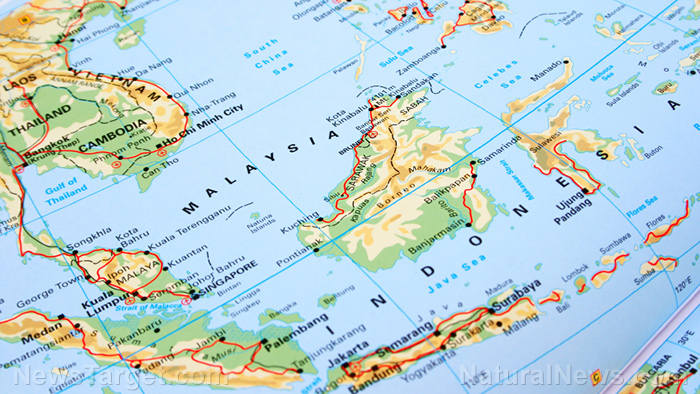 Parler
Parler Gab
Gab
Strategic geography a win-win for Malaysians and BRICS
It turns out that Malaysia is a vitally important country in the global scheme of things pertaining to trade. It controls upwards of 25 percent of the world's sea route trade via the Strait of Malacca (SoM). Put differently, 25 percent of the world's sea route trade passes through the Strait of Malacca, which is controlled by Malaysia. Singapore, Malaysia and Indonesia together border the Strait, one of the most important aspects of which is the fact that it is one of the quickest routes connecting the Indian Ocean with the Pacific Ocean. "This makes the Strait particularly important for both the United States and China in the realm of international commerce," explains Cimsec.org. "According to a 2016 report by the Center for Strategic and International Studies, roughly $874 billion in exports from mainland China passed through the South China Sea, a body of water that is linked to the Indian Ocean primarily by the SoM." "This dwarfs the same figure for the United States, which stood at $83 Billion. Despite this, prominent U.S. allies had high export values as well, such as South Korea ($249 Billion), Japan ($141 Billion), and Germany ($117 Billion). Additionally, it must be noted that not all exports sent through the South China Sea will go through the SoM. Due to its importance, the SoM has become a source of contention not only under the purview of economics, but security as well." One by one, the world's producing countries are joining BRICS while the mostly non-producing, overindulgent, corrupted West loses dominant status at increasing speed. What will be the straw that finally breaks the camel's back? Bank Muamalat Malaysia Bhd chief economist Dr. Mohd Afzanizam Abdul Rashid says that the benefits to the Malaysian people of their country joining BRICS will be enormous. "It will effectively insulate the country and the region from the changes in the United States' monetary policy and currency volatility, potentially improving predictability in the currency market and lowering transaction costs for exporters and importers," he is quoted as saying. Thailand is another nearby country that also wants to join BRICS, recognizing that the Western-controlled world order is collapsing. "Joining BRICS will enable member countries to align their positions on issues such as infrastructure development (following the Belt and Road Initiative model), economic policies as well as climate policies," says Mohd Sedek Jantan, a fellow of the Asian Financial Cooperation Association Think Tank. The latest news about the global transition away from the petrodollar and into BRICS can be found at Collapse.news. Sources for this article include: Reuters.com Cimsec.org NaturalNews.com Csis.org TheMalaysiaReserve.comBiden’s catastrophic performance in the debate raises more questions about his fitness for office
By Richard Brown // Share
Trump vows to abolish federal education department
By News Editors // Share
RIGGED: Pfizer cut deal to help Biden steal 2020 election
By Ethan Huff // Share
Russian economist unveils Putin’s masterplan as U.S. dominance ends
By Belle Carter // Share
EU hastens DE-DOLLARIZATION by stealing Russian money and giving it to Ukraine
By Kevin Hughes // Share
Governments continue to obscure COVID-19 vaccine data amid rising concerns over excess deaths
By patricklewis // Share
Tech giant Microsoft backs EXTINCTION with its support of carbon capture programs
By ramontomeydw // Share
Germany to resume arms exports to Israel despite repeated ceasefire violations
By isabelle // Share










